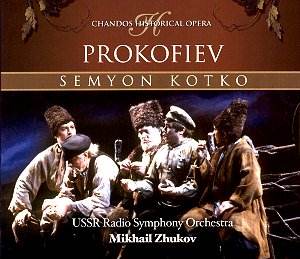The genesis of Semyon
Kotko, its problematical performance
history and subsequent almost total
eclipse from the stage was detailed
in editor Rob Barnett’s review of the
opera recently on this site and rather
than retell the tortuous and wretched
story I
direct you there. The most important
feature of Chandos’s reissue is that
Mikhail Zhukov was the conductor for
the work’s premiere at the Stanislavsky
Theatre in Moscow in June 1940. This
recording was made twenty years later
and Chandos’s booklet, all 124 not very
well bound pages of it, give the English
and the Cyrillic texts side by side
– as Rob noted the Cyrillic is not transliterated.
The sound quality is splendid however;
for a Russian recording fully forty
plus years old there is none of that
Melodiya crudity, or bizarrely flat
spatial perspectives. It’s an honest
theatrical perspective and the tapes
have come up sounding very well indeed.
No problems on that score.
There are however problems
about the opera. The propagandist element
is restrictive and some of the action
barely tolerable. For all that nothing
could ever quite efface Prokofiev’s
talent and in this, the fifth of his
eight operas, he is still capable of
acute settings and melodic impress.
There’s some jaunty expectation in the
opening scenes, and some expertly judged
string figuration – ghostly shudders
– in anticipation of Semyon’s reuniting
with his mother, whilst Prokofiev gives
a pesky bassoon part to the nosy neighbours.
The orchestral part is full of such
subtleties of characterisation – from
Semyon’s own motif and the string cantilena
that announces the love music to the
vigour of the music that animates the
defiance of the peasants. The Garden
scene is especially beautiful and gives
me, at least, intimations of the kind
of work Prokofiev might have written,
had the libretto and plot been less
circumscribed. Elsewhere the Betrayal
and Mad musics do have a powerful resonance
and charge – they carry also some ghostly
imprint of Boris Godunov - as does the
lower brass writing in the Farewell
scene and the stirring use to which
Prokofiev puts the chorus. But the work
sadly loses focus and impetus half way
through the Third Act and the ending
is untheatrical and anti-climactic.
The performances are
genuinely fine. Gres makes a notably
convincing Semyon and his colleagues
are equally committed, their techniques
quite capable of sustaining Prokofiev’s
demands with characterful orchestral
soloists and a master hand on the rostrum.
I have strong reservations about the
opera as a work of art but few about
the performances, the recording or Chandos’s
first class retrieval of this set.
Jonathan Woolf
see also review
by Rob Barnett
FULL SCENE AND TRACK DETAILS
CD1 [77:10]
1 Introduction - Andante 3:37
Act I
Tableau 1
2 In front of Semyon's cottage 1:49
Scene 1
3 Semyon: 'A soldier came back from
the front' 4:11
Scene 2
4 Mother: 'Who d'you want?' 4:03
Tableau 2
Scene 1
5 Second woman: 'The soldier Semyon
Kotko has come back' 2:00
Scene 2
6 Frosya: 'He's woken up, he's got dressed'
1:53
Scene 3
7 Semyon: 'Good day, friends and neighbours'
3:11
Scene 4
8 First woman: 'We are very pleased
to see you again' 1:53
Scene 5
9 Semyon: 'A soldier came back from
the front' 5:38
Scene 6
10 Sofya: 'It's papa coming back from
the market' 2:59
Scene 7
11 Remeniuk: 'Greetings, soldier! Welcome
home!' 6:52
Scene 8
12 Frosya: 'The sound of the rain' 3:19
Scene 9
13 Mikola: 'Frosya!' 3:15
Scene 10
14 Semyon: 'Mother ... Mother' 2:04
Act II
Scene 1
15 Tkachenko: 'I can't understand it'
2:47
Scene 2
16 Tkachenko: 'Khivrya! What's that?'
1:38
Scene 3
17 Remeniuk: 'We've got business with
you' 2:04
Scene 4
18 Remeniuk:'A young prince' 2:40
Scene 5
19 Tsaryov: 'We get the same sort ...'
3:43
Scene 6
20 Tkachenko: 'Women's tears!' 4:43
Scene 7
21 Three women etc: 'The groom is coming'
4:11
Scene 8
22 German NCO: 'Morgen!' 3:58
Scene 9
23 Interpreter: 'To eat?' 4:19
CD2 [53:27]
Act II (continued)
Scene 10
1 Remeniuk: 'Did you see me?' 5:17
Act III
2 A little garden alongside Tkachenko's
cottage 1:40
Scene 1
3 Sofya: 'I had the same dream again'
3:24
Scene 2
4 Tkachenko: 'Sonya! Is that you?' 3:37
Scene 3
5 Tsaryov: 'So it's the young prince!'
2:45
Scene 4
6 Frosya: 'I had a dream, Mikola' 3:11
Scene 5
7 Mikola: 'Early, early in the morning'
1:54
Scene 6
8 Tkachenko: 'I can't hear anything
...' 4:46
Scene 7
9 Mikola: 'Uncle Tsaryov ... Uncle Tsaryov
...' 3:42
Scene 8
10 Workman: 'Permettez-moi de parlais
français' 4:27
Scene 9
11 Tkachenko: 'Permit me to present
for your perusal' 1:02
Scene 10
12 Lyubka: 'No, no, that wasn't my Vasilyok'
2:14
Scene 11
13 Semyon: 'So things turn out ...'
1:59
Scene 12
14 Mikola: 'Uncle Semyon ... Uncle Semyon'
1:36
Scene 13
15 Sofya: 'Oh, Frosechka, it's terrible
...' 3:00
Scene 14
16 First Haydamak: 'The swine!' 8:38
CD3 [52:08]
Act IV
Tableau 1
Scene 1
1 Mikola: 'Oh my God, my God, forgive
me' 3:55
Scene 2
2 Remeniuk: 'So ... So ...' 4:41
Scene 3
3 Chorus: 'When I die, bury me in a
grave' 5:37
Tableau 2
Scene 2
4 Semyon: 'That means ... that means
...' 3:04
Scene 2
5 Semyon: 'Then we've got ...' 0:21
Scene 3
6 Mikola: 'Cu-ckoo. Cu-ckoo' 8:54
Scene 4
7 Remeniuk: 'Eh!' 5:17
Act V
Scene 1
8 Bandura player: 'Oh woe, bitter woe!'
4:24
Scene 2
9 Mother: 'Semyon!' 4:57
Scene 3
10 Tkachenko: 'He, he, he!' 5:01
Scene 4
11 Tkachenko: 'So now, stand up, my
friends' 4:45
Scene 5
12 Chorus: 'The cavalry flies over a
free Ukraine' 0:57

